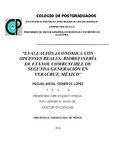| dc.contributor.author | Cisneros López, Miguel Ángel | |
| dc.creator | CISNEROS LÓPEZ, MIGUEL ÁNGEL; 493697 | |
| dc.date.accessioned | 2019-09-13T13:37:19Z | |
| dc.date.available | 2019-09-13T13:37:19Z | |
| dc.date.issued | 2016-11 | |
| dc.identifier.uri | http://hdl.handle.net/10521/4122 | |
| dc.description | Tesis (Doctorado en Ciencias, especialista en Economía).- Colegio de Postgraduados, 2016. | es_MX |
| dc.description.abstract | La producción de etanol combustible de primera generación en México podría traer inconvenientes, pues algunas materias primas provendrían de cultivos alimenticios como maíz (Zea mays) y caña de azúcar (Saccharum officinarum L.), lo que provocaría inestabilidad de precios y desabasto en el mercado. El etanol combustible de segunda generación, que se puede fabricar de desperdicios agrícolas, sería una buena solución para tener combustibles menos contaminantes de manera sustentable. El objetivo de este estudio fue evaluar la factibilidad económica, con opciones reales, de una biorefinería que se supone estaría ubicada junto al Ingenio San Cristóbal en Veracruz, para producir etanol combustible de segunda generación a partir de desperdicios de caña de azúcar. Se estimó que la biorefinería tendría una capacidad anual de producción de 143 millones de litros y una inversión total del proyecto en el orden de 307 millones de dólares. Se empleó la opción real de abandono del proyecto, para 5,10, 15, 20 y 25 años y se hizo la evaluación tradicional para 30 años. Los resultados indican que hasta el año 20 la biorefinería tendría un VAN positivo de 9.253 millones de dólares, y para el año 30 un VAN de 55.486 millones de dólares. Además, se pudo observar que un cambio en el precio del etanol sería la variable que más afectaría la rentabilidad de una biorefinería de este tipo. _______________ ECONOMIC EVALUATION WITH REAL OPTIONS: SECOND GENERATION FUEL ETHANOL BIOREFINERY IN VERACRUZ, MEXICO. ABSTRACT: The production of first-generation fuel ethanol in Mexico could bring problems, because some raw materials come from food crops such as corn (Zea mays) and sugar cane (Saccharum officinarum L.), causing shortages and price volatility in the market. The second-generation fuel ethanol, produced from agricultural wastes, would be a good solution to have cleaner fuels sustainably. The aim of this study was to evaluate the economic feasibility, with real options, a biorefinery that is supposed to be located next to the San Cristóbal Sugar Mill in Veracruz, to produce second-generation fuel ethanol from waste sugar cane. It is estimated that the refinery would have an annual production capacity of 143 million liters and a total investment in the order of US$ 307 million. The real option of abandoning the project was used for 5,10, 15, 20 and 25 years and became the traditional valuation for 30 years. The results indicate that until 20 years the biorefinery would have a positive NPV, US$ 9.253 million, and for the year 30 a NPV of US$ 55.486 million. In addition, it was observed that a change in the price of ethanol would be the variable that most affect the profitability of a biorefinery of this type. | es_MX |
| dc.description.sponsorship | Consejo Nacional de Ciencia y Tecnología (CONACyT) | es_MX |
| dc.format | pdf | es_MX |
| dc.language.iso | spa | es_MX |
| dc.rights.uri | http://creativecommons.org/licenses/by-nc-nd/4.0 | es_MX |
| dc.subject | Bioetanol combustible de segunda generación | es_MX |
| dc.subject | Biorefinería | es_MX |
| dc.subject | Desperdicios de caña de azúcar | es_MX |
| dc.subject | Evaluación económica | es_MX |
| dc.subject | Opciones reales | es_MX |
| dc.subject | Second-generation fuel ethanol | es_MX |
| dc.subject | Biorefinery | es_MX |
| dc.subject | Sugar cane waste | es_MX |
| dc.subject | Economic evaluation | es_MX |
| dc.subject | Real options | es_MX |
| dc.subject | Economía | es_MX |
| dc.subject | Doctorado | es_MX |
| dc.subject.classification | INGENIERÍA Y TECNOLOGÍA::CIENCIAS TECNOLÓGICAS::INGENIERÍA Y TECNOLOGÍA QUÍMICAS::PRODUCTOS DEL PETRÓLEO: GASOLINA, ACEITES Y CERAS | es_MX |
| dc.title | Evaluación económica con opciones reales: biorefinería de etanol combustible de segunda generación en Veracruz, México. | es_MX |
| dc.type | Tesis | es_MX |
| Tesis.contributor.advisor | García Salazar, José Alberto | |
| Tesis.contributor.advisor | Mora Flores, José Saturnino | |
| Tesis.contributor.advisor | Martínez Damián, Miguel Ángel | |
| Tesis.contributor.advisor | García Sánchez, Roberto Carlos | |
| Tesis.contributor.advisor | Portillo Vázquez, Marcos | |
| Tesis.contributor.advisor | Valdez Lazalde, José René | |
| Tesis.date.submitted | 2016-11 | |
| Tesis.date.accesioned | 2017 | |
| Tesis.date.available | 2017 | |
| Tesis.type | Tesis | es_MX |
| Tesis.format.mimetype | pdf | es_MX |
| Tesis.format.extent | 1,403 KB | es_MX |
| Tesis.subject.nal | Zea mays | es_MX |
| Tesis.subject.nal | Maíz | es_MX |
| Tesis.subject.nal | Corn | es_MX |
| Tesis.subject.nal | Saccharum officinarum | es_MX |
| Tesis.subject.nal | Mercados | es_MX |
| Tesis.subject.nal | Markets | es_MX |
| Tesis.subject.nal | Política pública | es_MX |
| Tesis.subject.nal | Public policy | es_MX |
| Tesis.subject.nal | Veracruz, México | es_MX |
| Tesis.rights | Acceso abierto | es_MX |
| Articulos.subject.classification | Evaluación económica | es_MX |
| dc.type.conacyt | doctoralThesis | es_MX |
| dc.identificator | 7||33||3303||332112 | es_MX |
| dc.contributor.director | GARCÍA SALAZAR, JOSÉ ALBERTO; 21083 | |
| dc.audience | generalPublic | es_MX |


